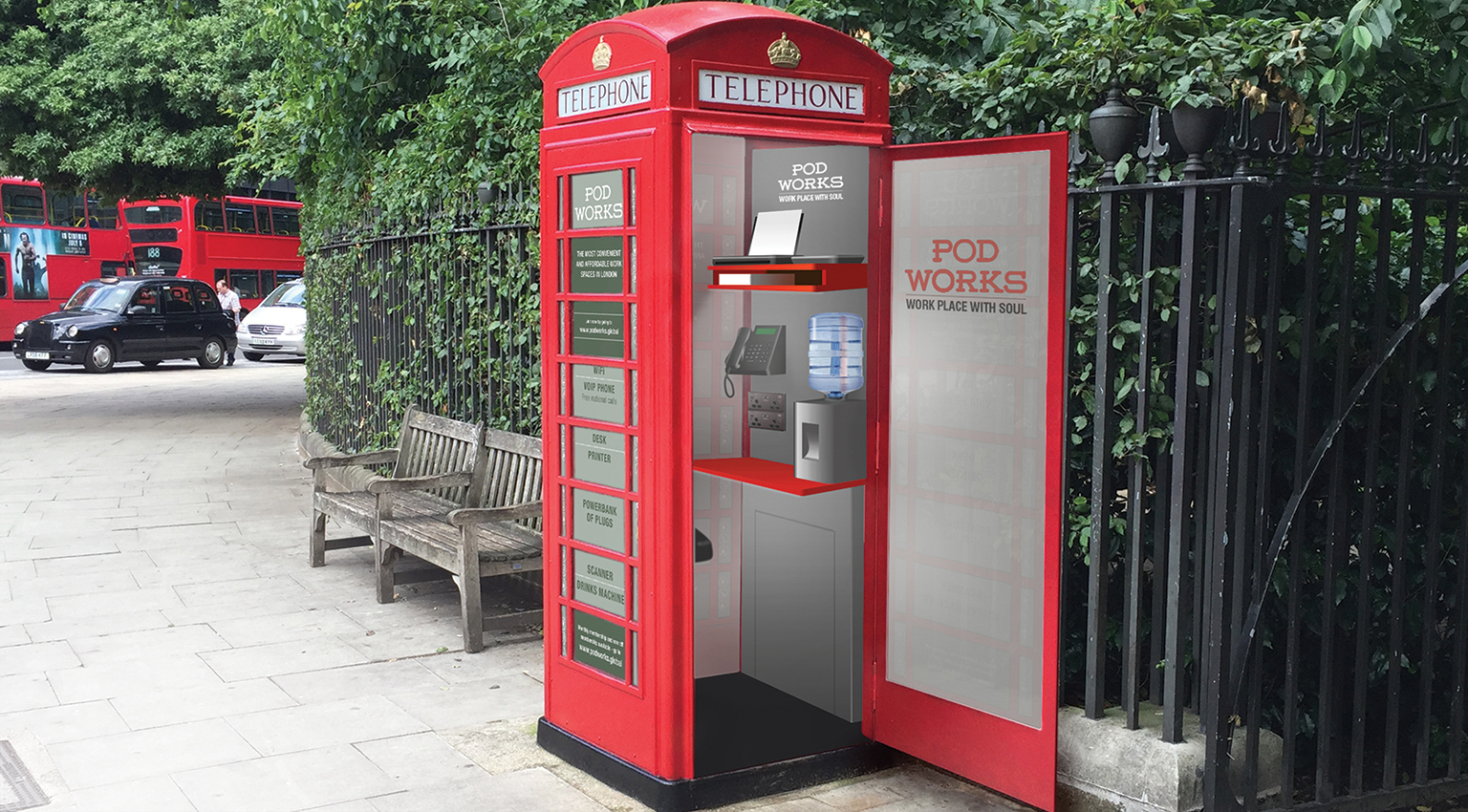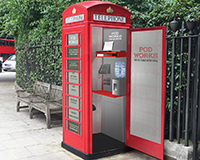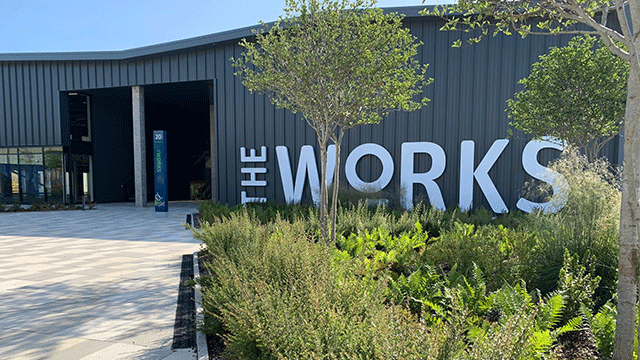
When Sir Giles Gilbert Scott designed the iconic red telephone box in 1924 he probably never imagined they would one day become offices, libraries, cafes and art galleries. These new-found functions have redefined a piece of uniquely British heritage that was at risk of being consigned to the history books.
The office version of the ubiquitous red cubicles heralds a new chapter in the story of their renaissance, not to mention in the ever-evolving concept of creative workspaces.
And it is all thanks to Pod Works, a company started by British entrepreneur Jonathan Black. A resident of New York, he is breathing new life into the phone boxes by transforming them into one-man workstations, delivering a level of convenience to workers on the go that has never been seen before.
It is not the first time Black has been inspired to conceive a new way of working, either. He is also the driving force behind a growing chain of co-working offices called Bar Works – offices that, as the name suggests, are effectively retrofitted restaurants or bars with desks and chairs arranged around them.
So what was the inspiration behind these innovative and convenient office concepts? What is Black’s vision for these business models and how much market appetite does he anticipate?
The price of two cups of coffee
His light bulb moment for Pod Works came in a most unlikely way. When going for a walk one day and “at a loss for things to do”, he came upon a red fire hydrant.
“It made me think of red phone boxes,” he says. “I thought, ‘wouldn’t it be really cool if you could transform those to work pods’, where you could do photocopying, or make quiet phone calls, rather than use a café where it can often be too noisy.
“For entrepreneurs and others constantly on the move, using one of our pods will allow them to focus on their job before an important meeting or presentation at less than the price of two cups of coffee a week”.
London-born Black acted quickly on this brainwave. Previously a venture capitalist in the City of London, as well as a stock broker and fund manager, he made some enquiries and discovered the Red Kiosk Company. Dedicated to the regeneration of the iconic phone boxes, Red Kiosk acts as a broker for the landlord, British Telecom.
Pod Works obtained each kiosk on a 10.5-year lease (with the right to extend), in an exclusive arrangement with the broker. Black declined to reveal the value of each lease, but said capital expenditure amounts to about £5,000 per station. Vending-machine guru Lorna Moore was appointed to oversee the implementation and operations of the firm.
The company’s growth plans are ambitious. It has planning permission to fit out 33 telephone boxes in UK cities, including around 10 in London, and expects to have 80 or so fitted out in total by the end of the year – at sites in Leeds, Manchester, Bristol, Nottingham, Manchester, Exeter, Plymouth and Grimsby – then 300 by the end of 2017.
“These are not boxes in a village by the tree,” says Black. “A lot of them are in locations next to Tube or train stations. My philosophy is all about visibility.”
Moore is confident the exacting fit-out of each of the pods will meet the needs of busy, travelling businesspeople. Facilities include Wifi, plug sockets, internet connection, printer, scanner, phone (with free UK calls to local, national and mobile numbers) and free coffee and tea.
Vigorous research has gone into even the smallest detail, including the angle of the seat, the quality of the connectivity and the locking mechanism. To access the workstations, customers are given a link to an app that allows access any time of day or night. A Pod Works booth is as “secure as Fort Knox”, Moore says.
Integral to the success of the enterprise will be Bar Works, the walk-in co-working venture Black launched in October 2015 with a $500,000 investment from a US tech start-up and $1.5m raised in three months through crowdfunding platform Crowd Equity. The company is now self-funding, with its profits ploughed into the telephone box business.
Bar Works has five sites in New York, three of which are already in operation, including in Midtown and Times Square, as well one in San Francisco that is set to open mid-October.
And there are plans to open further locations across the UK.
Like all of Black’s ideas, this started with a walk, followed by a flurry of entrepreneurial activity.
“In New York I walked past an empty restaurant, which looked like it had big areas on the top floors and great street frontage,” he explains. “Then I got a decent deal on it and that was the first Bar Works, in Midtown, Manhattan.”
Black again refuses to reveal the cost of the transaction, but says it was half the rate of the similar-sized unit next door.
“Some people tell us booze and work don’t mix and get the wrong idea. Then they try it out and discover that this is a serious working environment,” he says. “They see there is the opportunity to hold meetings and attend networking events around a bar.”
Bar Works was a response to what Black identified as the increasing difficulty in being able to find flexible space. In Manhattan demand was outstripping supply and space had to be booked well in advance.
When Black originally came up with the Bar Works concept he was working as a venture capitalist in London and frequently found himself having meetings in pubs. He came close to setting up the first Bar Works concept in a disused pub in Tower Hill, but then the 2008 recession hit.
The plan was to work from upstairs, rent out workspace and have meetings in the bar on street level – “we only needed a bartender”. But the cost of the lease was increased and Black had to back away.
Global ambition
Dublin will be Bar Works’ first opening outside of the US, followed by Bangkok, which will be the first of a new franchise model for the company. Locations are being sought back in the US in Austin, Texas, and Miami, Florida.
And Black is in discussions to launch in London finally too. He hopes to open the first Bar Works from a unit in the redevelopment of Battersea Power Station. But why Battersea?
“The city and Shoreditch are overpopulated with co-working offices,” says Black. “But I’m not ruling out opening there completely because they are full, as there is obviously a demand.”
Until that opportunity comes up, Black continues to invite suggestions for empty bars, pubs and other such spaces that could provide the right environment for workers looking for something a little different in their workspace – beer included.
The ambition is to grow Bar Works and Pod Works so that an international network of members can access all of the venues for a flat, all-inclusive fee starting at $50 (£38.35) a month, with no deposit and no minimum terms. A Pod Works-only subscription starts at £14.99 a month. This, the company says, is its USP in a crowded co-working market, particularly in London.
Visibility is key for Black. Whatever comes his way will have to have a strong street presence in the right area, because “if the economy tanks, you have to make sure you are in the right location”, he says.
With enquiries being taken from as far afield as São Paulo, Black believes there is global demand for his quirky workspaces. But while potential Bar Works sites will probably be found across the world, the red telephone box may be harder to come by outside the British Isles.
Perhaps its time for Black to take another walk.
•To send feedback, email rebecca.kent@estatesgazette.com or tweet @Writer_RKent or @estatesgazette











